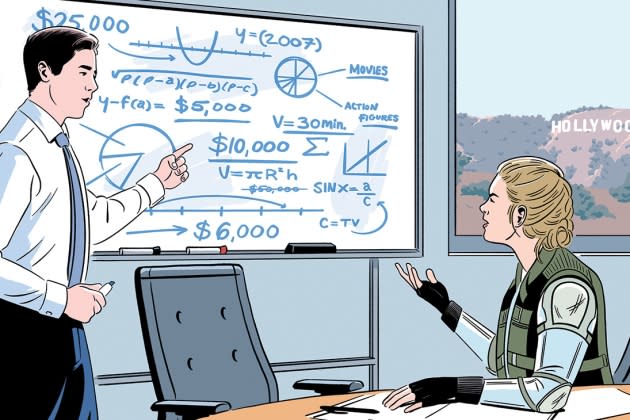
In July 2021, Scarlett Johansson stunned Hollywood with a lawsuit accusing Disney of breach of contract for sending Black Widow day-and-date to Disney+, a move her lawyers said diminished its box office (and the star’s backend compensation). As that legal battle stretched into the summer, two other Black Widow stakeholders were quietly seeking what they believed they were owed. The comic book creators behind Yelena Belova, the character played by Florence Pugh, spent months in a back-and-forth with Marvel to receive payment for her appearance in the film.
Writer Devin Grayson and artist J.G. Jones believed they would take home $25,000 each for her appearance in Black Widow thanks to paperwork they signed outlining how much they would receive for films, TV shows, video games and action figures featuring Yelena. But when Grayson and Jones, who created Yelena in 1999, eventually received payment in November, that $25,000 dwindled to about $5,000 without explanation.
More from The Hollywood Reporter
Grayson has spent the past year seeking an answer in a journey that sheds light on how Marvel compensates the comic book writers and artists behind the characters fueling the most successful film franchise in history. Those who work with the company describe a labyrinthine system that leaves creators wondering how Marvel arrived at its figures.
When she co-created Yelena, Grayson knew Marvel would own the character. But like many creators before her, she signed a contract known as a Special Character Agreement, one that outlines a Marvel-initiated payment system should Yelena appear in other media. The agreement, signed in 2007, seemed to state that Grayson would receive $25,000 for a theatrical film appearance, $2,000 for an episode of TV over 30 minutes, and $1,000 for an episode of TV 30 minutes or less. For action figures, the agreement entitled her to $5,000 for one figure released in a single year, $10,000 for two, or $25,000 for three or more. For video games, there would be a maximum of a $30,000 pot to be shared among all the creators who had characters in the game.
However, buried within the document was language that granted Marvel broad discretion to dramatically lower payments, language Grayson and others who spoke to THR say is misleading given that the $25,000 is listed prominently in the paperwork.
“It’s like the Publishers Clearing House Sweepstakes. You could win $1 million, but you won’t,” notes Grayson, who as a woman in a male-dominated industry did not want to make waves when she signed the agreement. She was happy to take what Marvel seemed to be promising her, and is only speaking out because she believes the company should stick to what it told creators.
After Grayson received her $5,000 of the promised $25,000 in November, she — with the help of an attorney — learned some of the ways Marvel cut down that sum.
For starters, Marvel splits the sum between the writer and artist. So, according to Marvel’s math, the most Grayson could have made from Black Widow is $12,500 — half of a $25,000 pot split with Jones, Yelena’s co-creator. What’s more, if a film features more than one character covered by a Special Character Agreement, the company will share the pot of money among all creators with skin in the game. In other words, she was told, the $25,000 for Black Widow would be shared across all stakeholders, presumably those behind characters such as Red Guardian (played by David Harbour) and Melina Vostokoff (Rachel Weisz). A Marvel source notes that there is no ceiling to the total money paid to creators for a project, and it might be raised depending on what is deemed fair. Given this, it likely paid more than $25,000 in total to artists and writers with a claim on Black Widow.
Reached by THR, Jones did not share specifics of his payments, but confirmed that he received money similar to Grayson’s. He says: “Having spoken to a number of creators, Marvel’s financial offerings seem a bit of a bait and switch. They throw out a large number, then little by little they whittle down the actual payout.”
Another way Marvel shrinks payments is by classifying some film appearances as “cameos.” According to sources, if a character appears for less than 15 percent of screen time, that’s considered a cameo — and thus its creators are due less money. By that standard, Sebastian Stan’s Winter Soldier, a character key to Captain America: Civil War, would be considered a cameo; he appeared in 22 minutes (just under 15 percent) of its 2 hour, 28 minute run time. Ditto for Captain America, who appeared for less than 7 minutes, 30 seconds of Avengers: Infinity War.
One potential money saver for Marvel is the world of video games, which every year eclipses the box office in terms of entertainment market share. According to sources, Marvel will pay creators for character appearances on console games only — not mobile games, a segment gaming observers note is on a fast rise and one source likens to being offered VHS royalties in an era in which Blu-ray is about to be the dominant force.
Some who spoke to THR say it is more beneficial for a creator to avoid signing any paperwork with Marvel, noting Special Character Agreements give the company wiggle room to pay essentially whatever they want and include an NDA clause that muzzles creators from speaking out. One source, who reps the creators behind several A-list Marvel characters, notes one client who never signed paperwork is better off than those who did. “He has a lawyer that doesn’t listen to Marvel,” says the source. (Marvel declined to comment, as it does not speak out on individual creator agreements.)
Joe Casey is among the creators who did not sign an agreement. The writer co-created America Chavez, a key character in the $954 million-grossing Doctor Strange in the Multiverse of Madness and has received no payment for her use in the film. But he’d rather speak out in hopes it can help change the system. “Maybe $5,000 means something to some kid in his early 20s that doesn’t have a career,” says Casey. “For a lot of us who have been in the business for decades, it comes off as an insult.”
A few months after Johansson and Disney settled the lawsuit, Yelena Belova showed up on the Disney+ series Hawkeye, cementing the character’s place as a key player in the Marvel Cinematic Universe. Per the agreement Grayson signed, she should receive $2,000 for a TV episode appearance (or $1,000 if split with Jones). When Grayson reached Marvel in July, she was informed that according to their calculations, that wasn’t quite right. How would $300 an episode sound?
A version of this story appeared in the July 20 issue of The Hollywood Reporter magazine. Click here to subscribe.
Best of The Hollywood Reporter




